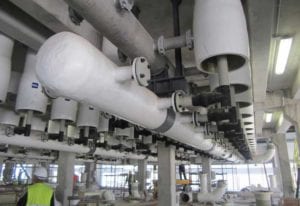Degrémont Technologies, a subsidiary of French water treatment giant Suez Environment, has teamed up with well-known chemicals company Dow’s Water and Process Solutions division to supply ultrafiltration and reverse osmosis membranes for a pilot desalination project in the United Arab Emirates (UAE) capital, Abu Dhabi.
The project aims to use 100% renewable energy for desalination and is being undertaken in partnership with local UAE renewable energy company Masdar. Ground breaking for a number of reasons, the project’s key differentiator is that desalination has traditionally been considered an energy-intense process and using renewables will make the use of this technology considerably more attractive for governments looking to prioritise projects with low environmental impact. Its long-term objective is to implement the best performing technologies in desalination plants across the United Arab Emirates (UAE). In addition, the solutions being applied are highly applicable to African countries as well, especially considering the energy restrictions that many developing countries face.Pilot project
Launched by Masdar in June this year, the 18-month project tested and developed energy-efficient seawater desalination technologies that can be supplied by renewable energy sources. At this stage it looks as though renewable energy is feasible for running the entire plant. The programme will include a full-scale facility to be operational by 2020. Degrémont’s contract covers the design, creation, supply, construction, installation, operation,maintenance and evaluation of the plant. The facility will offer more energy efficiency than current state-of-the-art desalination systems. Masdar will also be sharing the costs of building and operating the desalination plant. Not only does it have the potential to be 100% renewable energy source powered, it will also boast minimal environmental impact. After this first pilot phase, the second phase of the project will be dedicated to implementing the energy-efficient desalination technology on a large-scale.“We are very proud to have been selected to participate in Masdar Renewable Energy Seawater Desalination Program. As a world leader in water treatment we take innovation to heart to contribute to our clients’ strategy regarding their water challenges. Degrémont’s teams are committed to making this project not only a reality but also a remarkable first accomplishment of the Masdar-Degrémont partnership” says Rémi Lantier, CEO of Degrémont.








